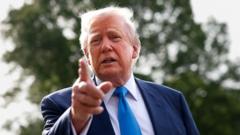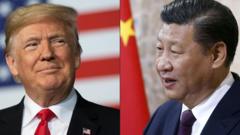With fears of Trump's unpredictable second term looming over Australia’s upcoming election, local politicians grapple with how to manage their ties with the US—an alliance vital for its national security. Amid rising concerns over global tensions, leaders are emphasizing domestic issues, though the shadow of US tariffs and Trump's demeanor injects uncertainty into the campaign.
The Impact of Donald Trump on Australia’s Political Landscape Ahead of Election

The Impact of Donald Trump on Australia’s Political Landscape Ahead of Election
As Australia prepares for its federal election, the influence of Donald Trump’s policies is reshaping the political battleground, prompting candidates to reconsider their stance on international relations.
In Western Sydney, a vibrant crowd enjoys a local rodeo, blissfully unaware that eclectic festivities underscore deeper political tensions. While they sip beers and revel in the thrill of bull riding, the specter of US President Donald Trump emerges prominently in the Australian political discourse leading up to the federal election on May 3.
As global conflicts flare, including those involving the US, the campaign trail takes on a rodeo-like unpredictability. With tariffs imposed under Trump's leadership affecting nations worldwide, Australians are beginning to feel the ramifications of a leadership that prioritizes forceful trade negotiations. Among the audience, fans express polarized views. Guy Algozzino, a rodeo enthusiast, champions tariffs as overdue protection. Contrarily, Jared Harris views unfolding geopolitics as a mere spectacle they can only observe.
Unlike the impassive attitude they held towards Trump’s initial election, Australians now face a domestic campaign reshuffled by his recent policy moves. Prime Minister Anthony Albanese’s critique of Trump as "not the act of a friend" has reverberated, and as the election nears, voters reflect on how the nation's alliances, particularly with the US, shape its foreign policy and economic backdrop.
With polls showing a surge for Albanese's Labor Party, the candidates are now compelled to directly confront the repercussions of the US's current leadership on Australia's stance. Notably, Albanese's six-state tour signals a shift in focus from international matters to essential domestic concerns like housing and healthcare—areas that resonate with many voters.
As political analysts note, the impact of Trump's tarnished reputation may inadvertently bolster support for Albanese, creating a rally effect similar to patterns observed in Canada. Election strategies now appear more focused on fostering a collective front against potential adversarial pressures, particularly from China, where Australia's historical alignment with the US has been paramount.
Even as sentiments fluctuate towards the US—recent polls show increasing mistrust—local leaders must navigate complex perceptions of alliances. The looming question of aligning Australia's interests with those of an unpredictable US renders the campaign more intricate.
Though candidates maintain a broad vision, including potential confrontations with Trump’s policies, their enterprising rhetoric is tempered by public sentiment, reflecting a desire for stability amid a tumultuous international scene. On the rodeo grounds, amidst cheers and the thrill of the event, the need for a clear and pragmatic political charting is increasingly apparent for Australia's future leadership.
As global conflicts flare, including those involving the US, the campaign trail takes on a rodeo-like unpredictability. With tariffs imposed under Trump's leadership affecting nations worldwide, Australians are beginning to feel the ramifications of a leadership that prioritizes forceful trade negotiations. Among the audience, fans express polarized views. Guy Algozzino, a rodeo enthusiast, champions tariffs as overdue protection. Contrarily, Jared Harris views unfolding geopolitics as a mere spectacle they can only observe.
Unlike the impassive attitude they held towards Trump’s initial election, Australians now face a domestic campaign reshuffled by his recent policy moves. Prime Minister Anthony Albanese’s critique of Trump as "not the act of a friend" has reverberated, and as the election nears, voters reflect on how the nation's alliances, particularly with the US, shape its foreign policy and economic backdrop.
With polls showing a surge for Albanese's Labor Party, the candidates are now compelled to directly confront the repercussions of the US's current leadership on Australia's stance. Notably, Albanese's six-state tour signals a shift in focus from international matters to essential domestic concerns like housing and healthcare—areas that resonate with many voters.
As political analysts note, the impact of Trump's tarnished reputation may inadvertently bolster support for Albanese, creating a rally effect similar to patterns observed in Canada. Election strategies now appear more focused on fostering a collective front against potential adversarial pressures, particularly from China, where Australia's historical alignment with the US has been paramount.
Even as sentiments fluctuate towards the US—recent polls show increasing mistrust—local leaders must navigate complex perceptions of alliances. The looming question of aligning Australia's interests with those of an unpredictable US renders the campaign more intricate.
Though candidates maintain a broad vision, including potential confrontations with Trump’s policies, their enterprising rhetoric is tempered by public sentiment, reflecting a desire for stability amid a tumultuous international scene. On the rodeo grounds, amidst cheers and the thrill of the event, the need for a clear and pragmatic political charting is increasingly apparent for Australia's future leadership.



















